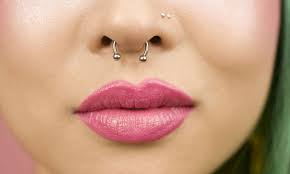
Even while piercings are more prevalent than ever, they should still not be taken lightly. Understand the risks, fundamental safety measures, and aftercare procedures.
Lips. Ears. Bellybuttons. Eyebrows. Particularly among teenagers and young adults, piercings are popular. However, problems might arise with piercings. Learn how your risk of infection and appropriate healing might be affected by particular safety precautions, the location of your piercing, and how well you take care of it.
Know the dangers
A piercing is the process of making a hole in a body part so that jewellery can be inserted. Rarely is a numbing agent used (anesthetic).
Any piercing has the potential of problems, such as:
Allergy symptoms
A few items of piercing jewellery, especially those made of nickel, can trigger allergic responses.
Oral health issues
When you wear jewelry on your tongue, you risk damaging your teeth and gums. When the tongue swells after a piercing, it can be painful to eat, drink, and even breathe for a while.
Infected skin
After a piercing, this could result in redness, soreness, swelling, or a pus-like discharge.
Further skin issues
By causing an expansion of scar tissue, piercing can result in scars and elevated regions.
Blood-borne illnesses
Bloodborne illnesses like hepatitis B, hepatitis C, tetanus, and HIV can be contracted if the piercing tool was contaminated with infected blood.
Trauma or tearing
Tearing out jewelry by accident may require stitches or other repairs.
If you get an allergic reaction, an infection, or another skin issue close to the piercing, you could need medicine or other therapy.
Be certain you're prepared
Be sure to give it some thought before getting a piercing. Think about where the piercing will be and whether you can disguise it if necessary, such as at work.
Consider delaying if you are unsure about getting the piercing or fear that you might regret it in the future. Don’t let yourself to feel forced into obtaining a piercing, and avoid getting one when inebriated or high.
Consult with friends who have piercings if you’re certain you want to get one. Ask them if they have any advice or regrets.
Insist on taking safety measures
Ask the following questions to make sure your piercing is performed safely:
How are the piercings done? Avoid piercing yourself or letting an unskilled friend perform the procedure. Visit a piercing shop with a good reputation and trained staff.
State-to-state differences exist in licencing standards and regulation requirements. For information on regional licences and rules, contact your city, county, or state health department.
Does the piercing artist use gloves? Make sure the piercer washes their hands before each piercing and dons a new set of disposable gloves.
Does the piercer have the right tools? Even though some establishments utilise piercing guns to pierce earlobes, the Association of Professional Piercers issues a warning that these instruments might harm ear tissue and cannot be thoroughly sanitised. In order to get an earlobe or other body piercing, find a piercer who first makes a hole with a brand-new, sterile, disposable needle before inserting jewellery.
Does the piercer clean non-disposable tools? Ensure that after each piercing, the piercer sterilises all non-disposable instruments in an autoclave or other heat-sterilization device.
Does the piercer use jewellery that is hypoallergenic? Inquire about surgical gold, titanium, niobium, or stainless steel that is 14 or 18 karats.
Maintain the health of your piercing
For a few days, the skin around a fresh piercing may be puffy, red, and sensitive. It may bleed a little. Contact your doctor if the bleeding, redness, or swelling persists for more than a few days. Early intervention can aid in avoiding potentially dangerous complications.
To avoid infection and promote recovery:
Use mouthwash to clean any oral piercings: After every meal and just before night, rinse your mouth with an alcohol-free, antiseptic mouthwash if you have had your tongue, lip, or cheek pierced. Use a fresh, soft-bristled toothbrush after getting your piercing to keep bacteria out of your mouth. Take the piercing out at night and brush the region to get rid of plaque when it has healed. Take it out before eating and before engaging in heavy activities.
Pristine body piercings: If you have skin piercings, wash the area with soap and water twice daily. Before cleaning your piercing site, make sure you wash your hands.
Don’t go swimming: While your piercing is healing, avoid using hot tubs, rivers, lakes, and other bodies of water.
Avoid playing with your piercings: Never twist jewellery or touch a fresh piercing unless you are cleaning it. Additionally, keep garments away from the piercing. Extra friction or rubbing might irritate your skin and slow the healing process.
Maintain the jewelry’s position: Although most piercings recover in around six weeks, some may take several months or even longer.

